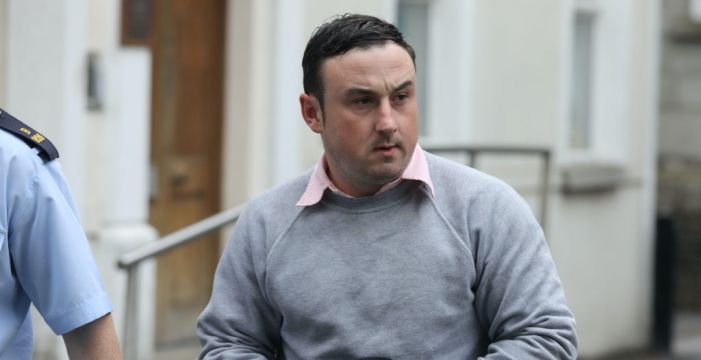Lawyers for Aaron Brady, who was convicted of murdering Detective Garda Adrian Donohoe, have argued that the prosecution had "zero appetite" to ask any questions of a key witness who had her testimony interrupted and were instead driven to keep the defendant's trial going under any circumstances.
They also submitted that although no investigation into the interruptions took place, the jury were read a transcript of an exchange between an unseen man and the witness that occurred in their absence, a decision that Brady's counsel submitted was "baffling" and "completely unlawful".
However, it was submitted on Tuesday at the Court of Appeal (CoA) by Brendan Grehan SC, for the Director of Public Prosecutions (DPP), that it had been thrown about like "brickbats" that the prosecution "sat on their hands" and did nothing to address unfolding events, none of which the barrister said could have been anticipated.
Counsel for the DPP said "an inquiry" into how key witness Molly Staunton - who gave testimony via video link from New York during the Covid pandemic - came to be interrupted by an unseen man "would have been an exercise in futility".
On the fifth day of the hearing before the three-judge appeals court senior counsel Michael O'Higgins, representing Brady, said the court erred in refusing to direct An Garda Síochána to carry out an investigation into the circumstances under which Ms Staunton's evidence was interrupted.
He said the court also erred in failing to investigate the "blatant and serious contempt" of court for the purpose of protecting the integrity of the trial process.
The lawyer further submitted that the court erred in determining that the deficiencies in her evidence could be cured by a warning to the jury, and in deciding to inform the jury by way of a summary of what had transpired in their absence.
Father of one Brady, who was jailed in 2020 for a minimum of 40 years for the murder of the detective, is bidding to overturn his conviction in a six-day hearing before the CoA.
Covid
Witness Ms Staunton was initially expected to travel from her New York home to Dublin to give evidence, but that plan was scrapped when Covid swept through New York.
The extent of the lockdown there was such that plans to have her give evidence via video link from a government building also had to be scrapped.
In the end, she gave her evidence despite complaints by Brady's defence that the scenario took away from the proper gravitas of a criminal trial.
Ms Staunton told the murder trial that Brady said he had to "carry around the guilt of having murdered a cop in Ireland".
Ms Staunton said in her direct evidence that Brady also claimed during a drunken "rant" to be "the most feared man in Ireland".
While Ms Staunton was giving evidence in front of the jury via video link from a New York apartment, an unseen man interrupted her.
Mr Justice White told the jury that there was a previous interruption by the same man when the jury was not present.
On that occasion, a radio could be heard in the background in the apartment and when the judge asked her to turn it down, she said to the man: "The judge says you have to leave. I don't want anyone else in the room."
Mr Justice White said the man became difficult when asked to leave and said: "Call another boy, you should be with a lawyer" and later he said: "Just f**king do it," and, "Tell them what you're supposed to tell them." Ms Staunton replied: "I'm not telling them."
In one dramatic incident, Ms Staunton was interrupted at a critical point in her evidence by the man, who could be heard saying "You f**k off" and then "put a stop to it, you can stop it right now, no more testimony", before the feed was cut off.
'Shot a cop'
The key part of her evidence was that she heard Brady admit that he "shot a cop" while he lived in Ireland.
Brady's lawyers argued that the jury would see the interruption as prejudicial against their client and even though there was nothing to suggest the man was acting on Brady's behalf, they said he could no longer get a fair trial.
The judge ruled the issue could be dealt with by a warning from the judge that it may be dangerous to rely on Ms Staunton's evidence.
Mr O'Higgins, for the appellant, submitted on Tuesday that the unseen man heard via the video link indicated a very aggressive person influencing Ms Staunton's evidence against a fraught and tense backdrop.
He said the procedure to be carried out when something like this unfolds should mirror as much as possible a witness giving evidence in court.
Counsel said the court should have established from a base level what was going on but that "no effort whatsoever" was made in this instance.
The barrister added: "There is a full-concerted policy simply not to ask any questions at all and then to proceed."
Mr O'Higgins submitted the jury might have thought his client was benefiting from this interruption or that he had something to do with it, or perhaps nothing to do with it, but that some "bad bad-minded friend had leaned on them".
Ms Justice Isobel Kennedy asked the lawyer what process would he envisage if this event had occurred in a more usual environment where a witness was giving evidence in court. Mr O'Higgins said an independent investigative guard would be appointed and the witness would be interviewed.
"Then we have the information and are in a position to make an assessment," he said.
Instructions
Mr O'Higgins suggested there was a contempt of court by Ms Staunton as she was given crystal clear instructions and a very stern warning at the end of the first day not to have anyone present where she was giving evidence.
He said the State felt entitled to turn their back on or ignore the interruption and not even ask witnesses to explain what had happened.
"They are saying they have an entitlement to do that; and it's an impertinence. There seems to be zero appetite to ask any questions," he said.
Failing that, counsel added, the court should have obtained statements from Ms Staunton and the unseen man to find out what had happened.
Counsel for the appellant went on to say that giving the jury a transcript of what had happened in their absence was "completely unlawful" and in breach of their jury oath to give a true verdict in accordance with the evidence.
He added: "I find it absolutely baffling that the court needed to explain to the jury how it all came about in this minute detail and yet there is a mountain out there and no one wants to look at it. Telling the jury about things that went on which they never witnessed is so legally unsound it would invalidate any conviction."
The appellant also said the only solution was to discharge the jury once the court said it was powerless to act and that the gardaí were not looking into it. However, he submitted the prosecution's drive was to keep the case going under any circumstances.
In reply, Brendan Grehan SC, for the DPP, said the judge was entitled to decline the application to discharge the jury as the matter was capable of being dealt with.
He said the judge made a decision based on what he saw in front of him and directed that the matter should proceed.
The judge, he submitted, was within his jurisdiction to do that, particularly at all times averting to the fairness of the trial being of paramount concern.
"It did not justify a discharge of the jury, but it did justify what the judge did in giving the jury very specific directions," he added.
'Vehement submissions'
Mr Grehan said the judge gave a summary to the jury of what had transpired in their absence during Ms Staunton's testimony and that this was done for the benefit of the defendant to enable them to look at her evidence with a jaundiced eye.
He said the judge was entitled to explain additional information to the jury to which they had not been party.
"The judge did this in ease of the position of the defence, and it is now ironic, having done it, it is now the subject of such vehement submissions," he said.
The barrister said the option for the prosecution at the time was no evidence from Ms Staunton or for her to give evidence from an apartment; "that was how stark it was". He accepted that the interruption during Ms Staunton's evidence was unusual, unfortunate and unanticipated but said it had no effect on her testimony.
Mr Grehan said he did not accept that it is always necessary to procure a statement from a witness and the judge had made enquiries to satisfy himself. "It has been thrown about like brickbats that the prosecution sat on their hands and did nothing about unfolding events, none of which could be anticipated," he said, adding that an inquiry would have been an exercise in futility.
Aaron Brady (32), previously of New Road, Crossmaglen, Co Armagh, is serving a life sentence with a 40-year minimum having been found guilty in 2020 of murdering Detective Garda Adrian Donohoe (41) at Lordship Credit Union in Bellurgen, Co Louth on January 25th, 2013.
Brady was also sentenced to 14 years for the robbery, a sentence that will run concurrently with the life sentence.
Det Gda Donohoe was on a cash escort when he was ambushed by a five-man gang and shot dead. The raiders stole €7,000 in cash during the robbery, which lasted 58 seconds.
Brady's trial was also the longest murder case in Irish legal history, lasting 122 court days. He was found guilty of the murder of Det Gda Donohoe by an 11-1 majority jury verdict at the Central Criminal Court in August 2020.
He was sentenced to the mandatory term for murder of life imprisonment in October 2020. As he had been found guilty of murdering a garda acting in accordance with his duty, the trial judge ordered that he serve a minimum of 40 years.
The appeal continues on Wednesday before Mr Justice John Edwards, presiding, Ms Justice Isobel Kennedy and Ms Justice Tara Burns.







